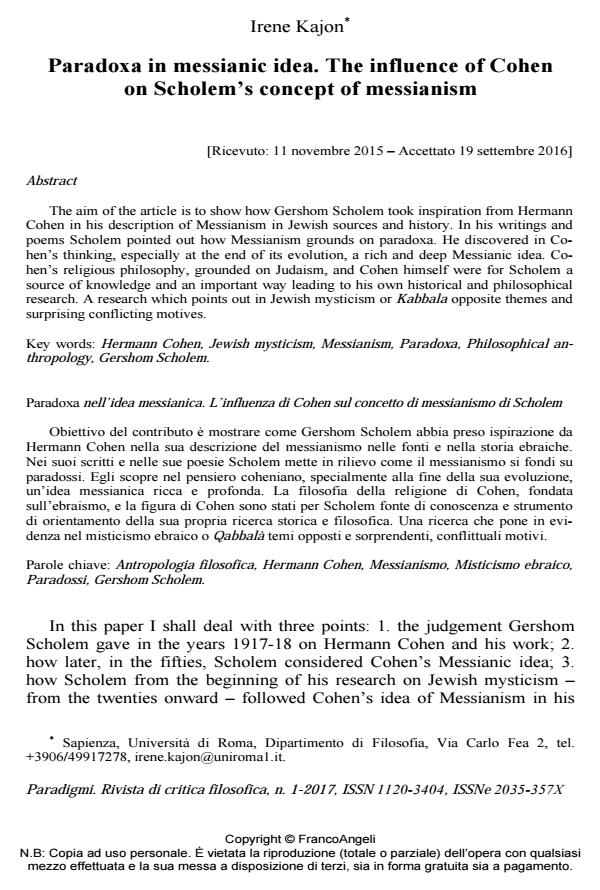Paradoxa in messianic idea. The influence of Cohen on Scholem’s concept of messianism
Journal title PARADIGMI
Author/s Irene Kajon
Publishing Year 2017 Issue 2017/1
Language English Pages 14 P. 129-142 File size 170 KB
DOI 10.3280/PARA2017-001009
DOI is like a bar code for intellectual property: to have more infomation
click here
Below, you can see the article first page
If you want to buy this article in PDF format, you can do it, following the instructions to buy download credits

FrancoAngeli is member of Publishers International Linking Association, Inc (PILA), a not-for-profit association which run the CrossRef service enabling links to and from online scholarly content.
The aim of the article is to show how Gershom Scholem took inspiration from Hermann Cohen in his description of Messianism in Jewish sources and history. In his writings and poems Scholem pointed out how Messianism grounds on paradoxa. He discovered in Cohen’s thinking, especially at the end of its evolution, a rich and deep Messianic idea. Cohen’s religious philosophy, grounded on Judaism, and Cohen himself were for Scholem a source of knowledge and an important way leading to his own historical and philosophical research. A research which points out in Jewish mysticism or Kabbala opposite themes and surprising conflicting motives.
Keywords: Hermann Cohen, Jewish mysticism, Messianism, Paradoxa, Philosophical anthropology, Gershom Scholem
- Bachmann I. (1964). Gedichte, Erzählungen, Hörspiel, Essays. München: Piper.
- Bauch B. (1916). Vom Begriff der Nation. Ein Kapitel zur Geschichtsphilosophie. Kant-Studien, 21: 139-162.
- Bolaffi A. (1995). Presentazione di E. Cassirer, Sul concetto di nazione. Una replica a B. Bauch. MicroMega, 2: 205-223.
- Cassirer E. (1902). Leibniz’ System in seinen wissenschaftlichen Grundlagen. Marburg: Elwert’sche Verlagsbuchhandlung.
- Cassirer E. (1906-1907). Das Erkenntnisproblem in der Philosophie und Wissenschaft der neueren Zeit. Vols. I-II. Berlin: B. Cassirer.
- Cassirer E. (1991). Zum Begriff der Nation. Eine Erwiderung auf den Aufsatz von B. Bauch. Bulletin des Leo Baeck Instituts, 34: 73-89.
- Cohen H. (1959). Religion der Vernunft aus den Quellen des Judentums. Köln: Melzer.
- Cohen H. (1987 ff.). Werke. Vol. I: Kants Theorie der Erfahrung (1. ed. 1871; 2. ed. 1885; 3. ed. 1918). Vol. II: Kants Begründung der Ethik (1. ed. 1877; 2. ed. 1910). Vol. III: Kants Begründung der Ästhetik (1889). Vol. VI: Logik des reinen Erkenntnis (1. ed. 1902). Hildesheim-New York: Olms.
- Dilthey W.-Yorck von Wartenburg P. (1923). Briefwechsel 1877-1897. Halle (Saale): Niemayer.
- Hoeres P. (2004). Krieg der Philosophen: die deutsche und britische Philosophie im Ersten Weltkrieg. Paderborn: Schöningh.
- Jones L.E. ed. (2001). Crossing Boundaries: The Exclusion and Inclusion of Minorities. New York-Oxford: Berghahn.
- Kajon I. (1989). Ebraismo e sistema di filosofia in Hermann Cohen. Padova: Cedam.
- Kajon I. (2002). Il pensiero ebraico del Novecento. Una introduzione. Roma: Donzelli.
- Kajon I. (2012). Ebraismo laico. La sua storia e il suo senso oggi. Assisi: Cittadella Ed.
- Kajon I. (2016). Introduzione. In: Scholem G., Giona e la giustizia e altri scritti giovanili. Brescia: Morcelliana.
- Mendes-Flohr P. (1999). German Jews. A Dual Identity. New Haven-London: Yale University Press.
- Rosenzweig F. (1976 ff.). Der Mensch und sein Werk. Gesammelte Schriften. Vol. II: Der Stern der Erlösung. Vol. III: Zweistromland. Kleinere Schriften zu Glauben und Denken. Dordrecht: Nijhoff.
- Scholem G. (1928). Über die Theologie des Sabbatianismus im Lichte Abraham Cardozos. Der Jude, 9: 123-139.
- Scholem G. (1931). Zur Neuauflage des “Stern der Erlösung”. Frankfurter Israelitisches Gemeindeblatt, 10/1: 15-17.
- Scholem G. (1938). Zehn unhistorische Sätze über Kabbala. In: Geist und Werk. Festschrift zum 75. Geburtstag von Dr. Daniel Brody, Zürich: Rhein Verlag, 1958: 209-215.
- Scholem G. (1941). The Major Trends in Jewish Mysticism. Jerusalem: Schocken Books.
- Scholem G. (1971). The Messianic Idea in Judaism and other Essays on Jewish spirituality. New York: Schocken Books.
- Scholem G. (1973). Shabbatai Zvi. The Mystical Messiah. Princeton, NJ: Princeton University Press.
- Scholem G. (1980). From Berlin to Jerusalem: Memories of my Youth (1. German ed., 1977). New York: Schocken Books.
- Scholem G. (1981). Walter Benjamin: The story of a friendship (1. German ed., 1975). New York: Schocken Books.
- Scholem G. (1996). On the Kabbalah and its symbolism (1. German ed., 1960). New York: Schocken Books.
- Scholem G. (2000). Tagebücher, nebst Aufsätzen und Entwürfen bis 1923. Vol. II: 1917-1923, hrsg. von K. Gründer, H. Kopp-Oberstebrink, F. Niewöhner with the collaboration of K.E. Grözinger. Frankfurt a. M.: Jüdischer Verlag.
- Scholem G. (2002). “Es gibt ein Geheimnis in der Welt”. Tradition und Säkularization. Ein Vortrag und ein Gespräch, ed. by I. Shedletzky. Frankfurt a. M.: Suhrkamp.
- Scholem G. (2003). The fullness of time. Poems. Jerusalem: Ibis (Engl.transl. by R. Sieburth. Introduction by S.M. Wasserstrom).
- Scholem G. (2013). Il sogno e la violenza. Poesie, ed. by I. Kajon. Firenze: Giuntina
Irene Kajon, Paradoxa in messianic idea. The influence of Cohen on Scholem’s concept of messianism in "PARADIGMI" 1/2017, pp 129-142, DOI: 10.3280/PARA2017-001009